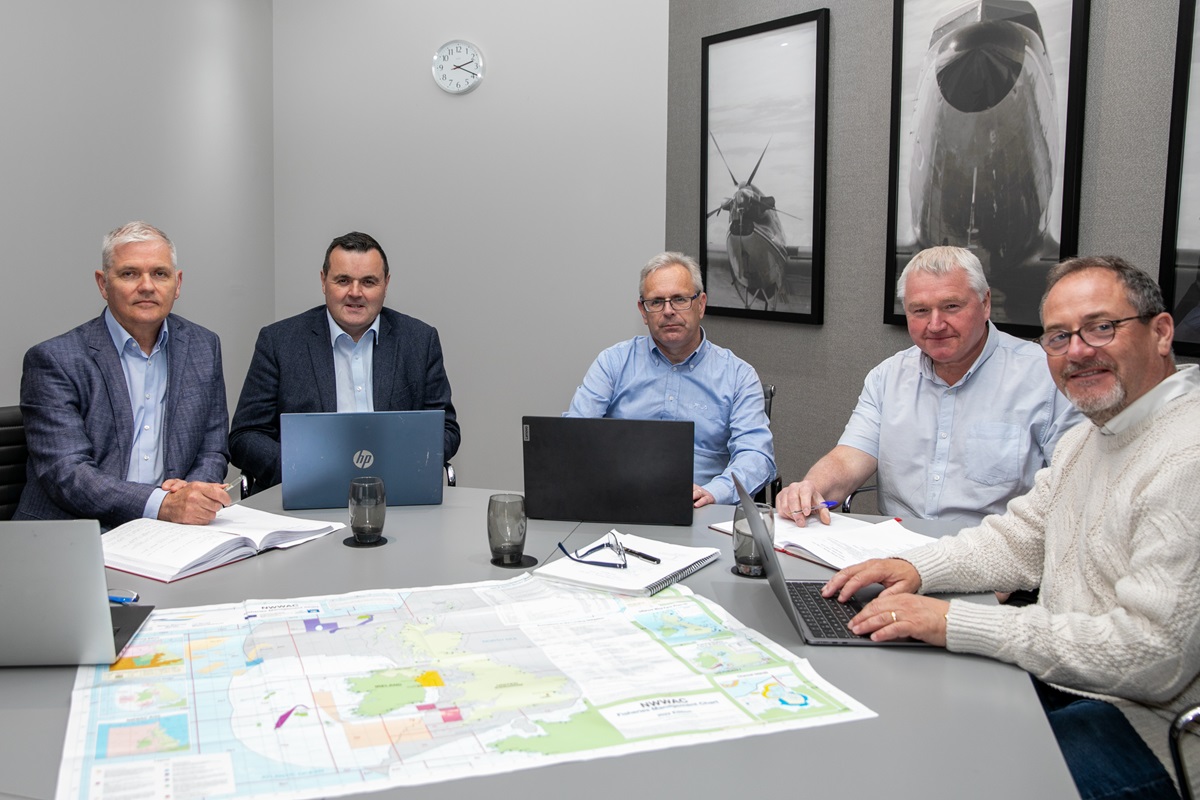The Seafood Ireland Alliance says 2025 will be another difficult year for the fishing industry following mixed reactions to the Annual Fisheries Council held in Brussels this week.
The negotiations, which began on Monday and concluded in the early hours of Wednesday morning, resulted in the application of Ireland’s Hague Preferences for a number of key stocks. These included important whitefish stocks and, for the first time, Mackerel and Herring.
Pictured above: Seafood Ireland Alliance members Aodh O Donnell CEO of the IFPO, Brendan Byrne CEO of the IFPEA, Dominic Rihan, CEO of the KFO, John Lynch CEO of the IS&EPO and Patrick Murphy CEO of the IS&WPO
A spokesperson for the Alliance, which comprises five fishing industry organisations, said, “The outcome of the Council is probably as good as we could have hoped for, given the scientific advice for key stocks. We have had a positive outcome on some of our priorities but there is no doubting 2025 will be another difficult year for the fishing industry”.
The agreement reached in Brussels has resulted in an increase in Irish quotas for 2025 of around 4%. However, the Alliance says that this does not reflect the true picture.
The Irish industry will see an estimated loss in value of fish landed in the order of €7 million. For mackerel and prawns, two of Ireland’s key stocks, there are quota reductions of 16% and 13%, respectively. This equates to a combined loss in earnings of €20 million.
These quota losses have been partly offset by increases in the quotas for haddock, monkfish, herring, boarfish, and horse mackerel.
The Seafood Ireland alliance comprises the Irish Fish Producers Organisation (IFPO), the Killybegs Fishermen’s Organisation (KFO), the Irish South & West Fish Producer’s Organisation (IS&WFPO), the Irish South & East Fish Producers Organisation (IS&EFPO) and the Irish Fish Processors & Exporters Association (IFPEA).
Summing up the overall picture, the Alliance members said: “The big cuts agreed for some stocks are going to further reduce fishermen’s incomes coming on the back of the losses of quotas following Brexit. There are some positives undoubtedly, but we need a plan and a vision for the future if the industry is to survive.”
The main positive from the Council was the delivery of the ‘Hague Preferences’ for mackerel, herring and whitefish stocks. These preferences are a long-standing Common Fisheries Policy mechanism that recognise Ireland’s heavy dependence on stocks fished in Irish waters. They ensure improved quotas of designated stocks when the designated quotas fall below a certain level. For mackerel, this marks the first time the Hague Preferences has been invoked by Ireland. It recognises the decline in this stock resulting largely from overfishing by non-EU countries.
The Alliance spokesperson says, “Invoking the Hague Preferences was vital on this occasion. It has resulted in Ireland clawing back 4,000 tonnes of mackerel valued at around €8 million. Without this and increases for other pelagic stocks, the Irish pelagic fleet would be facing a perilous situation financially”.
He went on to say, “We lost 26% of our mackerel quota under Brexit and the scientific advice for next year was for a further 22% reduction. This would have been a frightening situation to be facing into in 2025”.
The outcome for the whitefish fleet operating on the south coast was less positive. Negative scientific advice for cod, haddock, pollack and sole has led to only small quotas being allocated to Ireland for 2025. This will make operating in the Celtic Sea exceptionally difficult and will force fishermen to fish further afield to stay profitable.
The Alliance spokesperson explained, “If you take the example of sole where we have a quota of less than 33 tonnes for 2025 under EU rules when we have exhausted this small quota, we must stop fishing entirely as there is a risk of having a small unintended bycatch of sole. The same applies to pollock where the quota is a mere 48 tonnes.”
The Alliance spokesperson concluded by saying, “We acknowledge the work of the Minister and his officials in the long and difficult negotiations over the last few months, culminating in the December Council. The Minister has delivered on many of the industry asks and we commend him for delivering these elements. However, we still face an uncertain future. To deliver tangible outcomes for our members, we need ongoing engagement with industry from the new Minister, whoever that may be. Together, we can navigate our way through what is going to be another challenging year”.








